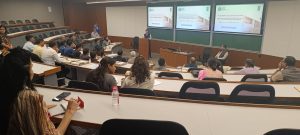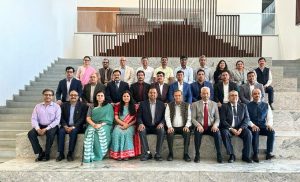“Just Transition” Training Workshop for Policymakers
A three-day training workshop was held at IIM-Ahmedabad from 18th – 20th December 2023, which brought together senior bureaucrats from Jharkhand and Karnataka to delve into the intricacies of just transitions, sustainability, and social inclusion. The workshop was conducted in collaboration with the United Nations Development Programme (UNDP).
The key takeaways from the workshop were –
- The workshop highlighted the urgency of transitioning from fossil fuel-based energy to renewable sources, highlighting potential social, economic, and political disruptions and advocating for international collaboration in line with Paris Agreement commitments.
- Experts underscored the multifaceted nature of the energy transition challenge, emphasizing the need for sustainable business practices beyond moral objectives.
- Discussions explored the complex dynamics of climate change discourse, including the interplay between climate science and political agendas, ethical dimensions of climate policy, and the importance of nuanced approaches to environmental policy implementation.
- The evolution of climate change discourse from a purely scientific issue to one influenced by political agendas was underlined emphasizing the need for a nuanced understanding.
- Speakers highlighted the need for strong strategic planning, data-driven decision-making, and collaboration with stakeholders for successful just energy transition.
- Clear and effective communication of policies, along with the creation of opportunities that offer tangible benefits and long-term prospects was discussed as a critical step for successfully implementing policies at the grassroots level and engaging stakeholders effectively.
- Participants also highlighted the need for a deeper engagement and capacity building for government stakeholders at all levels within the state on the various aspects of a just energy transition.
Session-wise Summary of the Workshop –
Prof Bharat Bhaskar, the Director of the institution, inaugurated the event, emphasizing the pivotal role of transitions in the contemporary society. Mr. Ajay Kumar Rastogi, Chairman of Jharkhand’s Sustainable Just Transition Taskforce highlighted the need to have shift in societal perceptions towards renewable energy opportunities, emphasizing stakeholder engagement, energy diversification, and long-term planning for a just transition in Jharkhand. Throughout the program, participants engaged in discussions on policy advocacy, skill development, and community support measures, emphasizing the importance of targeted interventions and broader policy frameworks.
Day 1 –
Sessions – Introduction to Perceptions Around Climate Change and the Journey of Just Transition

Prof Anish Sugathan, IIMA led the first technical session, tracing environmental challenges from the 1960s (especially touching upon the period of industrialization) and underscoring the complexity of addressing global climate change. He illustrated the impact of fossil fuel transitions on major economies like the USA, China, India, and France, emphasizing the need for just and equitable pathways.
Prof. Namrata Chindarkar, IIMA, led the subsequent session on social inclusion and policy interventions for just transitions, framing climate change as a ‘super wicked problem’ fraught with challenges such as lack of clarity, coordination, and political commitment. The participants engaged in lively debates, addressing questions related to justice, values, policy lock-in, and social inclusion in the transition process.
Throughout these sessions, the importance of international cooperation was underscored, drawing parallels with the successful mitigation of ozone layer depletion. The discussions also touched upon the complexities of climate change, with competing interests hindering global consensus on mitigation strategies.
Day 2 – Sessions – Just Transition – Indicators, Planning Process and Way Forward
On the second day of the workshop, Dr. Anish Sugathan facilitated a group activity utilizing the En Roads website (https://www.climateinteractive.org/en-roads/). The participants engaged in hands-on exploration by manipulating climate levers, adjusting variables such as energy efficiency, afforestation, deforestation, renewable energy etc. The objective was to collaboratively ensure that these modifications resulted in maintaining global temperatures below the critical threshold of 2 degrees Celsius. This interactive session aimed to provide practical insights into the complexities of climate dynamics and the interplay of different factors in achieving climate goals. Participants gained a deeper understanding of the challenges associated with balancing various components to mitigate climate change effectively.
This was followed by a session on “Planning in Just Transition” led by Prof Rohit Chandra from IIT Delhi, noting the gradual integration of JT components into planning processes. The significance of the JT Framework by iForest, resulting from intense research, was underscored, suggesting a structured approach to planning transitions. Additionally, reference to a state-backed project in Jharkhand was made which referred to the potential for impactful initiatives at the regional level. Lastly, Prof. Chandra highlighted the inclusion of loan programs in Australia as a solution component that emphasized the importance of practical and financial considerations in achieving a just and sustainable transition.
The final session of Day 2 by Prof. Prasad Modak, Founder MD EMC focused on key sectors, primarily energy and agriculture, which is predicted to play a pivotal role in the journey of Just Transition. He highlighted the necessity for various reforms and pointed out that significant policy initiatives have been undertaken in South Africa and Indonesia. Addressing challenges related to the end of life in these sectors, a suggestion was made to establish a policy on circularity, particularly in the development of solar-based and solar energy sectors. The session also emphasized the role of the business community, with Distributed Renewable Energy (DRE) as the anchor and noted that IIM has compiled a compendium of business models in this domain. Lastly, Prof Modak proposed a study of viable business models, underscoring its importance in navigating the transition process effectively.
Day 3 – Visit to Modhera Sun Temple
On the third day of the workshop, senior bureaucrats embarked on a visit to the Modhera Sun Temple, a site fully powered by solar energy. The purpose of this visit was to showcase how historical landmarks can adopt sustainable practices. During the tour of the temple, they witnessed firsthand the utilization of solar technology, which not only sustains the temple itself but also provides energy to nearby households. This demonstration highlighted the potential of renewable energy to preserve cultural heritage while simultaneously benefiting local communities.


